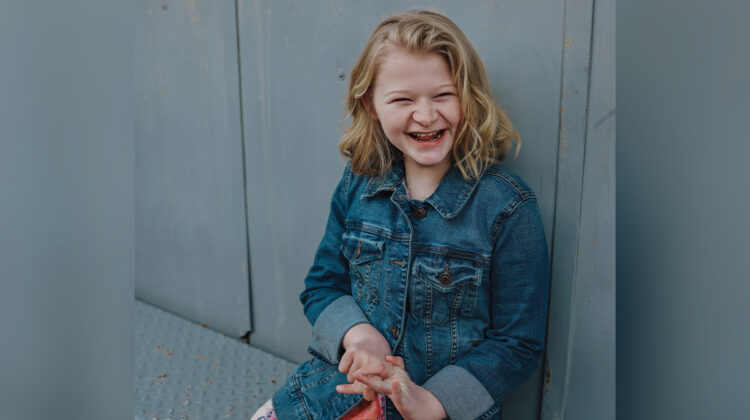For finding a cure
Photo by In His Image Photography
For the Webb family, August signifies the beginning of a new school year for each of their three children: Hunter (14), Harper (11), and Hayden (6). It also marks the third year for the Harper’s Hope annual golf scramble at Ben Hawes Golf Course, an event created to raise money for the Foundation for Angelman Syndrome Therapeutics (FAST). When Harper was 11 months old, her parents, Derrick and Johnna Webb, received the news that Harper had been diagnosed with Angelman Syndrome. Rather than succumb to the fear of uncertainty, the couple made the choice to create a nonprofit in order to begin fundraising for a cure.
The Diagnosis
“We knew at eight weeks something wasn’t right,” Johnna said. “By definition alone, Angelman’s is a severe neurological disorder. Most children with Angelman have seizures and are very intelligent children and individuals. They have a normal life expectancy — they may have a lot more challenges than others.”
Angelman Syndrome (AS) is a genetic disorder which affects approximately 1 in 15,000 people, meaning there are roughly 500,000 people in the world living with AS. There are different varieties of Angelman Syndrome, with the most common being deletion. Harper has deletion of the fifteenth chromosome. Genetic testing revealed that she was missing the maternal side of the fifteenth chromosome, resulting in a diagnosis of Angelman Syndrome. Deletion of the chromosome on the paternal side is referred to as Prader-Willi syndrome.
Children with AS experience delays in crawling and babbling and may develop intellectual disabilities. Like Harper, most Individuals with AS typically smile often and have excitable personalities, are non-verbal or have limited speech, often have difficulty walking or maintaining their balance, and struggle falling asleep and staying asleep.
“She uses an augmented device and she has gestures she uses,” Johnna said. “If we ask her yes or no questions, she can answer appropriately by grunting and pointing or she shakes her head for what she wants.”
Her parents said that they have heard Harper use one-word responses such as, “No,” “Hi,” “Mom,” “Dad,” and “Bub.” They often find they have to persuade her for a response, especially for more difficult tasks like saying her own name.
“I think my biggest thing would be to hear her speak,” Johnna said. “I want to hear her voice and tell us about her day, because she can’t come home and tell us that.”
Although Harper learned to walk when she was 3 years old, she often uses an adaptive stroller for longer distances. She also receives speech, occupational, and physical therapies during the half-day timeframe that she is not attending Highland Elementary School (HES).
“Harper only goes to school three half days because we have so many therapies,” Johnna said, adding that the minimal social interaction with students coupled with Harper’s inability to express her feelings clearly has made it difficult for the almost-fifth grader to establish genuine friendships.
“She has quite the personality, but it’s hard for her to make friends because she doesn’t talk like most kids, but we are getting there,” Johnna said. “It’s taken us a long time to nurture and grow friendships and trust…It took us from preschool until now to grow those relationships.”
Johnna added that Harper’s fourth grade year at Highland was by far the best school year she has had.
“I think our greatest accomplishment at school is those kids learned how she communicates.They communicated with her and she communicated with them and they can communicate with each other,” Johnna said. “It’s about educating people about it [Angelman Syndrome].”
What She CAN Do
With her contagious smile, Harper Randi can captivate a room, a church entrance, and a golf course. Through therapy, she has learned to walk up and down stairs using reciprocal movement. She is incredibly skilled at using an iPad and can use a pencil to scribble, but can not yet write her name. She can drink from a cup, feed herself, and assist in the process of getting dressed.
“In our eyes, we celebrate the small gains that Harper makes over time, because in reality they are really big gains,” Derrick and Johnna said.
Harper loves to swim, ride a bike, and was a member of the Team Karlie racing team during the International BBQ Festival 5K in May.
“The community is embracing her and learning her personality,” Derrick said. “Harper has so much potential; she is smart and she is capable. Does that mean she’s going to go to college? Probably not. But that doesn’t mean she can’t be taught, she can’t learn, and she can’t grow — that she can’t be the best person that everyone around her helped her to be.”
Recently, Harper successfully participated in the Bailey test, where she was required to sit independently in a chair for two hours.
“For four years she sat in my lap to do it — those little things are huge to us,” Johnna said. “My hope for years to come is to keep the momentum for school, or the little things people take for granted, like putting clothes in the laundry or taking out the trash, and for her to gain more independence as she grows older.”
The Webb family relocated to Owensboro from Louisa, Kentucky, in 2016 as a result of Derrick’s position with AK Steel.
“We have been in Owensboro for seven years now; Owensboro is our home,” Derrick said. “It would be hard for me to leave Owensboro and take Harper out of this environment because she is thriving so well.”
Harper receives services from several area organizations including Wendell Foster, Surpass Behavioral Health ABA Therapy, and Dream Riders of Kentucky.
After relocating from a smaller town of less than 3,000 people, Derrick and Johnna said they feel “really fortunate” that Owensboro offers such a wide variety of therapies that are easily accessible and in close proximity to where they live.
Hope for the Future
Derrick said that when he and Johnna first learned of Harper’s diagnosis, he had a difficult time with the news.
“I initially struggled with the diagnosis and thought, ‘What did I do to deserve this?’” Derrick said. “Then you see Harper and that smile and think, “What did she do to deserve this?’ Johnna said, ‘We can give up or make her the best she can be — we can start a nonprofit.”
And that is just what they did.
In 2013, with the support of their parents and two friends, and fueled by their desire to find a cure for Angelman Syndrome, Harper’s Hope was born. The cupcake logo inspired by the nickname Johnna used for Harper prior to her birth.
“We got into the Angelman community when a lot of things were taking off in terms of research,” Derrick said. “There is so much science involved, where they know how to fix it — it’s the monetary part, they don’t have.”
The first ever Harper’s Hope golf scramble was held at Yatesville Lakes Golf Course in Louisa in June of 2014, in honor of Harper’s second birthday. A charity scramble has been held each year since on the first Saturday in June. Harper’s Hope held its tenth annual golf scramble on June 3, 2023.
“I was a golfer and played in scrambles and knew charity golf outings raised some money,” Derrick said. “The first outing raised $5,000. In ten years, we have grown it from $5,000 to $26,000.”
Since moving to Owensboro, the Webbs have established a second golf scramble for Harper’s Hope that occurs each August. Aug. 5, 2023 marks the third annual golf scramble for the Ben Hawes location. Over the past 10 years, Harper’s Hope has offered a variety of items in order to raise money for a cure, including T-shirts, bracelets, hats cups, stickers, and campfire chairs.
“Since we started Harpers Hope in 2013, we’ve donated a little over $215,000 dollars to FAST research,” Derrick said. “There are several human clinical trials going on now and for us that’s what our money is doing. Our money is helping fund those clinical trials.”
Although life can often be hectic raising three children and working year-round to raise money for research, the Webbs say they wouldn’t change a thing.
“We’ve never let Harper’s disability affect how we live day to day. This is our normal,” Derrick said. “I wouldn’t change it. She is who she is and we are who we are. Harper’s Hope and our story, this is who we are. I wouldn’t change a thing, other than to cure Angelman.”

